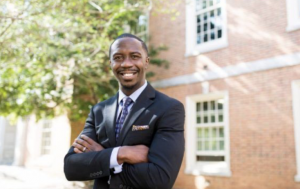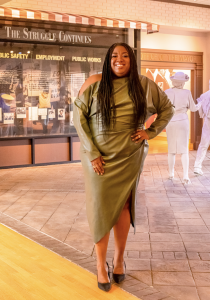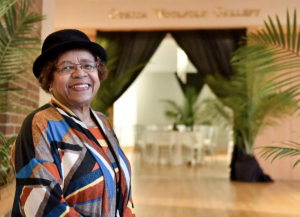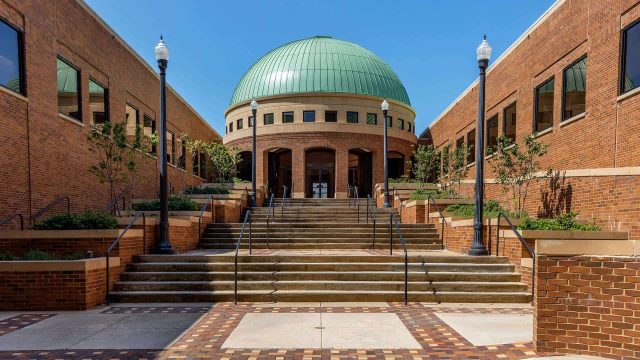By Ryan Michaels
The Birmingham Times
DeJuana Thompson, president and CEO of the Birmingham Civil Rights Institute (BCRI), doesn’t remember a year of her youth in city public schools when she didn’t visit the Institute for programming. And while those many experiences helped shape Thompson’s adolescence, it wasn’t until she was about 25 that the BCRI first “came alive” for her, she said.
Thompson, as a community liaison for then-City Council President Carole Smitherman, now Judge Smitherman, was tasked with helping to develop the 2005 programming to honor the four little girls killed in the 1963 Sixteenth Street Baptist Church bombing.
The program, titled “From Tragedy to Triumph, focused on the atrocity and the changes that came about as a result the bombing; it featured then-Secretary of State Condoleezza Rice and former United Kingdom Prime Minister Tony Blair. The time she spent doing planning and research for the program with then-BCRI CEO Lawrence Pijeaux and his staff helped her really understand the Institute’s purpose.
“They just brought so much into focus how the Institute doesn’t just stand as a place that’s preserving history. It’s really about taking the knowledge of what happened and applying it to opportunities for us to advance human rights today,” Thompson said.
The BCRI will host its 30th anniversary at Haven (2515 6th Ave. S., Birmingham AL 35233) on Friday, November 18. The celebration begins at 6 p.m. and will feature performances by R&B singer Lalah Hathaway, as well as remarks from former Birmingham Mayor Dr. Richard Arrington, BCRI co-founder Odessa Woolfolk, Mayor Randall Woodfin, and Thompson.
The BCRI will also present its most distinguished honor—the 2022 Rev. Fred L. Shuttlesworth Human Rights Award—during the event. This year’s recipient is Myrlie Evers-Williams, activist, author, and wife of the late Medgar Evers. Mississippi native Evers-Williams has been a lifelong champion of Civil Rights, starting in the mid-1950s, when she and her husband opened the first National Association for the Advancement of Colored People (NAACP) field office in their home state.

Isaac M. Cooper, chairman of the BCRI board of directors, said Evers-Williams embodies many characteristics of the late pastor and Civil Rights fighter for whom the award is named.
“Every year, we consider candidates whose legacy embodies the principles that characterized the life of Rev. Shuttlesworth—a philosophy of nonviolence and reconciliation; courage, both moral and physical, in the face of great odds; humility; leadership by example; and an established commitment to human rights activities,” Cooper said.
“Spirit of Work”
Across its three decades of operation the BCRI, which first opened on Nov. 16, 1992, has become one of the city’s top tourist attractions and maintained a high profile and been used as a model institution for others internationally, while also staying attuned to the local community, said Thompson: “That’s how you raise resources, … but we’re nothing if we’re not accessible to those who walk past the street every day.”

president and CEO of the Birmingham Civil Rights Institute (BCRI). (Amarr Croskey, For The Birmingham Times)
Thompson, who first joined the BCRI as interim president in March 2021 and was made permanent in May 2022, focuses on the “spirit of the work” to keep the Institute centered on action, helping people connect with one another through the stories told by the Institute.
Thompson said, “You and I, we may have different things that motivate us, but what are the commonalities, if I meet you in this place or if I meet you on this term, that can enable us to have an idea or at least begin to think about a shared reality, shared strategy, or shared solution for the things that impact our community?”
A veteran of political organizing herself, Thompson said the approximately 18 people who make up the full-time BCRI staff are in the business of bringing people together.
“I’d consider all of us organizers on our staff because we are, every day, having to sort of organize people into a conversation, engage them around a series of concepts, engage them around the idea that they have a responsibility to the legacy of freedom, to the pursuit of freedom, to the pursuit of justice,” she said.
Thompson is particularly proud of the BCRI’s Legacy Youth Leadership Program, which exemplifies the organization’s focus on action by providing instruction to high school students about Civil Rights history and how to engage in what are often considered “difficult” conversations about that history.
Following their studies in the program, the students then serve as docents for the Institute, enabling them to guide visitors and speak about what is covered in the Institute’s exhibits. The program, which often brings about professional opportunities for students at the BCRI and elsewhere, produces quick, positive results, Thompson said.
“That’s one of the most immediate ways that we see the impact of our work, living in the individuals that we are able to invest in,” she added. “They’re now leading and becoming advocates and activists, who will go out into the community on their own as leaders.”
The Legacy Youth Leadership Program is an example of Thompson’s personal mantra for the Institute: “Seeds today, fruit tomorrow.”
“Not all seeds bloom in the time that we can see them. Think about people like the Rev. Dr. Martin Luther King Jr., like Fannie Lou Hamer. They didn’t necessarily get to see all of the fruit [that grew from] the seeds they planted, but we get to benefit from that fruit,” Thompson said.
“I love that we get to plant seeds that I know will bloom,” she continued, “… It’s just a perk that we get to see some of those things in person pretty quickly because the work allows us to do that.”
Another way the BCRI continues its mission of being action-oriented is through new ways of using technology to tell Civil Rights stories, said Thompson, pointing to possibly bringing holograms and new tech into exhibits at the Institute.
“It’s one thing for someone to come into a space and read and go through. … That’s great, but the inspiration to do more comes from being connected in a different way,” she said.
The Beginning
The birth of the BCRI was the result of about 14 years of work.
In 1978, former Birmingham Mayor David Vann was the first to float an idea for a Civil Rights museum that would tell the city’s stories of racial struggle. But it wasn’t until 1986 that then-Mayor Arrington appointed a task force comprised of educators, Civil Rights activists, city officials, and local historians, as well as business and community leaders, to develop initial plans, according to an account written by Odessa Woolfolk, who co-chaired the task force.
“I thought it was an excellent idea,” said Arrington, who was a Birmingham City Council member at the time.
Once he was elected mayor in 1979, Arrington set out to make Vann’s vision a reality.
“It was very important to me that young people understand the history here,” said Arrington. “It is easy to think that things have always been the way they are now, but what happened in Birmingham in the 1960s is not ancient history.”

The task force developed the concept as an Institute, instead of a museum, to emphasize its place as an “action-oriented establishment,” Woolfolk wrote, which sought to “focus on what happened in the past, to portray it realistically and interestingly, and to understand it in relationship to the present and future developments of human relations in Birmingham, the United States, and perhaps the world.”
Thompson said, “[Our founders] were very adamant about [creating an] Institute because they knew they wanted to provide a robust experience that didn’t just stop at the museum experience. They wanted people to think, to consider, and to get activated around what they were learning and seeing, and to take that and do something with it. We still want that.”
Despite the support of both Vann and Arrington, residents seemed uninterested in the initial plans, according to Woolfolk, and two separate bond issues to fund the Institute were voted down.
“Some people said, ‘Don’t open up old wounds,’” Woolfolk recalled in a 2017 interview with The Birmingham Times. “Others questioned if the Institute was the best use of taxpayers’ money when there were potholes to be fixed, schools that needed improving, and residents who needed better jobs and homes.
“Our response was we were advocating for all of those things,” Woolfolk said. “We were advocating for better schools, for fair employment, and for fair housing.”
The task force felt that for the city to be better in the future, it had to take an honest look at its past, said Woolfolk: “We thought what we were doing had to be done. We made the case that recognizing your past is a part of healthy growth, and there’s the old saying that if you don’t remember the past, you’re doomed to repeat the worst parts of it.”
Arrington and other leaders pressed on, compiling plans for a Civil Rights District around Kelly Ingram Park, and eventually getting enough revenue through other bonds that didn’t require votes, as well as through the fundraising of a 15-member board that had been put together in 1990.
In its opening week in November 1992, the Institute welcomed more than 25,000 visitors.
Shared Legacy
Thompson came on as the BCRI’s interim director after a few difficult years for the organization.
In 2018, the Institute announced that renowned Civil Rights activist and educator Angela Davis, a Birmingham native, would be that year’s recipient of the Fred L. Shuttlesworth Human Rights Award, an honor given out by the BCRI every year. The following January, however, the organization rescinded its announcement, which was reinstated only following outcry from residents and city leaders, including Mayor Woodfin, who claimed the institute leaders had shown “poor stewardship.”
Following the award fiasco, which resulted in the departures of all but one member of the BCRI’s formerly nine-member board of directors (now expanded to 21), came several other challenges. In 2020, the COVID-19 pandemic significantly reduced attendance and the Institute’s then-president of five years, Andrea Taylor, resigned. Additionally, Thompson said, the increasing unrest related to police killings of Black people, following the death of George Floyd in May 2020, on top of everything else, had dealt some “gut hits” to the BCRI “like many components of our community.”
“I think that because the Institute is a living, breathing thing, it is going to always have real challenges,” the president and CEO added. “We as humans, as living breathing things, we have different seasons, we have different things that we go through, and we come through those things. We come out on top, hopefully.”
Looking forward, the BCRI can realize a larger role in by increasing engagement among people locally, Thompson said.
“The more proximate people get to the Institute, the more they come back in the doors, the more they engage with our programming, engage with our students, engage with our staff, engage with our elders, the oral histories, … I think they will find and remember, ‘Wow, we really do have a jewel! This is our Institute. It’s our legacy. It’s a shared legacy.’”
The BCRI will host its 30th anniversary at Haven (2515 6th Ave. S., Birmingham AL 35233) on Friday, November 18. The celebration begins at 6 p.m. For more on BCRI’s 30thcelebration visit here





